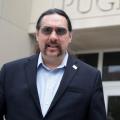Historians, theologians, artists, and activists reflect on where we go from here.
PEOPLE ALL OVER the United States, and indeed the world, flooded city streets en masse when media outlets called the presidential election for Joe Biden on the fourth day after Election Day in November, four days of a nation holding its breath. In a year marked with repeated tragedy, a collective sigh of relief found form in marching bands and dance parties. Eight months into social isolation brought on by the coronavirus, many felt, if only for a moment, united. That was on a Saturday.
Then came Sunday. The prophetic word from pulpits across America: There can be no unity without justice. As of this writing, we know that more than 73 million Americans voted for Donald Trump—neighbors, family, members of our churches. We are a divided nation, a divided church. We reckon with this reality even as we look forward with hope to a new year and a different administration. As we begin to mend our social fabric and heal from the compounded traumas of 2020, Sojourners invited leaders from various sectors to offer their thoughts on the way forward. —The Editors
Illustrations by Steffi Walthall
Until Justice Rolls
While much of the prophetic tradition indicts God’s people for breaking covenant with their creator, Amos’ prophetic eye is turned toward the folks who break covenant with their neighbors. Crushing the livelihood of the poor, doing nothing to alleviate their suffering, these would-be faithful people break the natural law—the ubuntu law—that humans are inextricably connected, our destinies bound together.
Amos indicts God’s people for turning justice into wormwood and throwing righteousness to the ground. Rather than the noisy way they praise God in worship, Amos calls the people to “let justice roll on like a river and righteousness like a never-failing stream.” The words justice and righteousness constitute a “hendiadys,” one idea in two words. When Amos pairs justice—mishpat—with righteousness—tsedek, the prophet means a just, righteous rule, ordered by God’s intention for the world, by God’s economy. In God’s just and righteous reign on earth, there is healing, harmony, wholeness; there is truly freedom, liberty, and justice for all.
Though the presidential election is over, the work is not finished; good people of moral courage are called to inaugurate a society of justice and righteousness flowing for everyone. We’ll be finished when no child is separated from her mother and when not one woman unknowingly has her womb separated from her body while incarcerated on the border or in a detention site of terror. We’ll be finished when the millions of Americans who live in poverty are liberated from it. When the great disparity between white livelihood and Black lives and Black wellness is repaired because white supremacy takes its knee off the necks of Black folk; when children, women, and nonbinary, brown, Indigenous, queer, Muslim, Sikh, and Jewish folk are all fully welcomed as precious in this land that claims to be one nation under God, we’ll be finished.
A Work in Progress
We in Canada watched your election with nail-biting intensity, getting the cups of tea ready for an influx of refugees from south of the border. Thankfully, that won’t be necessary just yet.
Now there’s a breathing space. It’s not a destination, it’s a way station. Bottle of water, snack, pats on the back from encouraging bystanders, and then off you’ll go again, long-distance runners.
This is a perilous journey, with many rocks and icebergs. For such a journey you need an Ice Captain: cool hand, knows the terrain, pays attention to what the science of radar says, keeps in mind the welfare of everyone on board. Looks like you just got an Ice Captain. That’s good.
All Americans should be aware that the vultures are gathering: Many in other countries are working for your shipwreck. We hope and believe you will prove them wrong. What else is needed? Sojourners work for “social justice,” but “justice” has two opposites. One is injustice, and in fighting it a person could be tempted to employ an undesirable form of justice-revenge. But revenge begets revenge begets revenge. The other opposite of justice is mercy. Christians know that mercy is at the core of their good-news message: Forgiveness of enemies was very rare in religions before Christianity. It’s also very hard to do.
What form could mercy take at the moment? Possibly it might require listening to what your “enemies” might actually have to say. Not everyone can be crammed into a box with just one label. Not everyone who disagrees with you is in bad faith. Some honestly think Plan A would benefit everyone, while others believe Plan B would be better. Listen carefully. If you do, perhaps others will be willing to listen to you.
America is a work in progress. So is democracy. Autocrats worldwide wish America ill: If democracy fails in America, there will no longer be a beacon of liberty and they themselves will feel justified as tyrants and pirate kings. “See? It doesn’t work!”

A History of Violence
Election week marked the 100th anniversary of the Ocoee Election Day Massacre of 1920. In the wake of World War I, African Americans in 35 counties across Florida organized tens of thousands of new voters. Black Floridians vowed to put an end to white supremacy and to tear down the one-party state.
Ocoee is a town in western Orange County, Fla., and at that time many African Americans had earned a modicum of independence through farm and home ownership. The people of Ocoee sought to use the ballot to bring equality and justice to a state that boasted the highest per capita lynching rate in the nation.
In response, white supremacists launched a campaign of mayhem, assassinations, and voter suppression across the state, culminating in a two-day siege of Ocoee. White terrorists, including military veterans, law enforcement, and businessmen burned houses, destroyed churches, and killed an estimated 35 people. When it was over, Black voting in this part of the state was crushed for generations, Ocoee became an all-white town for six decades, and affluent whites in central Florida took over African American farms.
A century later, we remember the Election Day martyrs in Florida by fighting for justice harder than ever. Even as we celebrate the defeat of Donald Trump, we should remember that the powers behind the Trump movement will be with us for the rest of our lives. The American ruling class has demonstrated that it will be pursuing an apartheid-like strategy to preserve elite, white rule. These tactics include voter suppression, economic inequality, and use of the divide-and-conquer strategy in an effort to use fear to pit us against each other. We cannot let this happen.
In Florida, community and labor organizers have combined “street heat” movements such as “Fight for $15” with union organizing, defense of immigrant rights, and municipal politics to combat the reactionary state legislature. Local organizations have successfully passed anti-wage theft measures, higher minimum wages, and renters’ rights ordinances. While we did not carry the state for Biden, we carried Amendment 2—which set Florida’s minimum wage at $15—by 60 percent!
We are keeping the memory of the struggles and sacrifices of Ocoee Election Day martyrs by attempting to bring to fruition the aspirations for democracy they expressed so heroically a century ago.
Moral Authority in a Pandemic
From a Q&A with Leana Wen
President Donald Trump’s strategy around the pandemic has been one of surrender, of capitulation. His chief of staff, Mark Meadows, even said we can’t control the pandemic, moving on to talk about the vaccine and therapeutics that they were holding out hope for. That, to me, summarized the Trump administration’s approach: We are going to let the virus rip through communities, and we are going to cross our fingers and hope there will be a vaccine that will save the day.
The single biggest challenge facing President-elect Joe Biden is how to win the hearts and minds of the American people. He can pass, and even implement, great policies, but unless he can get the American people to follow his moral authority, he will not be successful. You can have a federal mask mandate, but if half of the country refuses to abide by it, it’s not going to do much good.
On day one, Biden should start having briefings with the American people by his top public health experts. I hope also that he will have a 21st century version of the fireside chats, where he will level with the American people and talk about the actions that we can all be taking, that we have a common enemy here, that it takes all of us working together in unity to defeat this virus and reclaim our economy. The American people are looking for that kind of moral leadership. And he should not wait until Jan. 20. It will be too late by then for hundreds of thousands of people.
An Unapologetic Way Forward
“Out of the bars and into the streets,” Harvey Milk shouted through a bullhorn in San Francisco’s Castro District. Milk prophetically forecast the way coming out and educating friends, family, and neighbors would change hearts, minds, and voting habits. While this strategy undoubtedly progressed LGBTQ rights, it came at a steep emotional cost for all who engaged in these sacred and secular debates.
The gift of the Trump administration is that anti-trans actions were so blatant that we no longer need to prove the harmful effects of discrimination against trans and gender-queer individuals. Once inaugurated, the Biden-Harris administration could swiftly reverse the executive actions that rolled back trans rights in schools, shelters, health care, and the military.
When change comes, trans individuals and our allies should resist debates about our dignity, sacredness, or our private parts. Instead, we must boldly proclaim trans theology without apology. We must lift up the stories of the trans saints of the early church and the many sacred names for trans individuals that existed prior to colonization.
Unapologetically proclaiming trans sacredness is the antidote for the deadly rhetoric trans folk have endured for decades. On Trans Day of Remembrance, Nov. 20, we remembered those (47 in the U.S. and 386 worldwide whose names we know) that were killed in anti-trans violence over the previous year. The greatest political action trans and gender-queer individuals can take is to live boldly, wherever they are.
Marching to a Clean Energy Future
Over the past four years, the Trump administration has worked aggressively to undo environmental protections—including withdrawing the U.S. from the Paris Agreement, rolling back the Clean Power Plan, and reversing more than 100 environmental rules, ignoring and exacerbating our worsening climate crisis. At the same time, growing majorities of people across the U.S. and in the church are waking up to the reality of climate crisis—and innovations such as clean energy and high-efficiency technologies are becoming increasingly viable alongside natural climate solutions such as habitat protection and restoration.
Under the Biden administration, we can build on what’s already working and scale things up at the national and international levels. In addition to rejoining Paris, a major step forward would be to finally pass legislation that puts an honest price on carbon. This would make clear the true costs of pollution and incentivize carbon sequestration and other market-based responses.
The church has a role to play. We need to lament the widespread desecration of God’s creation, repent for our complicity and self-centered idolatries, and work to reform our communities, in part by learning from Indigenous peoples on the front lines of environmental injustice and climate action. Climate change intersects with racial injustice, forced displacement, public health crises, and much more; we must address these together, in solidarity with our sisters and brothers around the world.
As the transition to a clean energy future continues marching forward, we can contribute the prophetic vision and moral will to help society speed up this urgent transition while making it more just and equitable. This includes joining with groups such as Young Evangelicals for Climate Action and A Rocha and advocating for socio-ecological adaptation and resilience. As Christians, we have a remarkable opportunity in these unprecedented times to show God’s love and hope for all people and places.
It's Time for the Media to Be Biased
For our fragile and flawed nation to survive, the fourth estate must decisively come down in favor of democracy and facts. Our institutions were tested, bent, corrupted, and frayed during the past four years. Disinformation, foreign interference, and conspiracy theories that existed on the fringe now pass for mainstream Republican talking points.
The same institution that is supposed to hold power accountable, be adversarial if necessary in the pursuit of facts, and inform the citizenry was often a willing enabler and participant in the ongoing Trump reality TV show. He was lavished with nearly $5 billion of free media advertising during his 2016 campaign. Former CBS CEO Les Moonves admitted that Trump’s candidacy “may not be good for America, but it’s damn good for CBS.” CNN head Jeff Zucker gave candidate Trump debate advice, mulled TV projects with him, and referred to him as “the boss.” NBC invited him to host Saturday Night Live. This was all done after he proposed a Muslim ban, called Mexicans “rapists” and “criminals,” and promoted the racist birther conspiracy.
It was a Faustian bargain. Their initial reward for complicity was excellent ratings. It ended with Trump and his base using the language of fascists to refer to the media as “the enemy of the people” and “fake news” simply for reporting facts critical of “the Chosen One.”
When the media becomes complicit with power, it becomes its blunt instrument. For too long, we have entertained a “both sides” false equivalency in entertaining President Trump and the Republican Party’s bad faith in promoting disinformation and manufactured grievances. Enough. Too much is at stake.
Access, ratings, book deals, and proximity to power come at a massive cost. The price could be our fragile democracy and the integrity of the fourth estate, which actively needs to establish itself as a check on power. One way to do this is to refuse to book guests who spew lies, actively challenge falsehoods from the White House and elsewhere, de-platform hatemongers, demand social media giants and cable news do better to limit disinformation, and stop treating the fourth estate as a Sunday sporting event.
We still have a chance to get this right, but only if we demand better and work toward it.













No comments:
Post a Comment